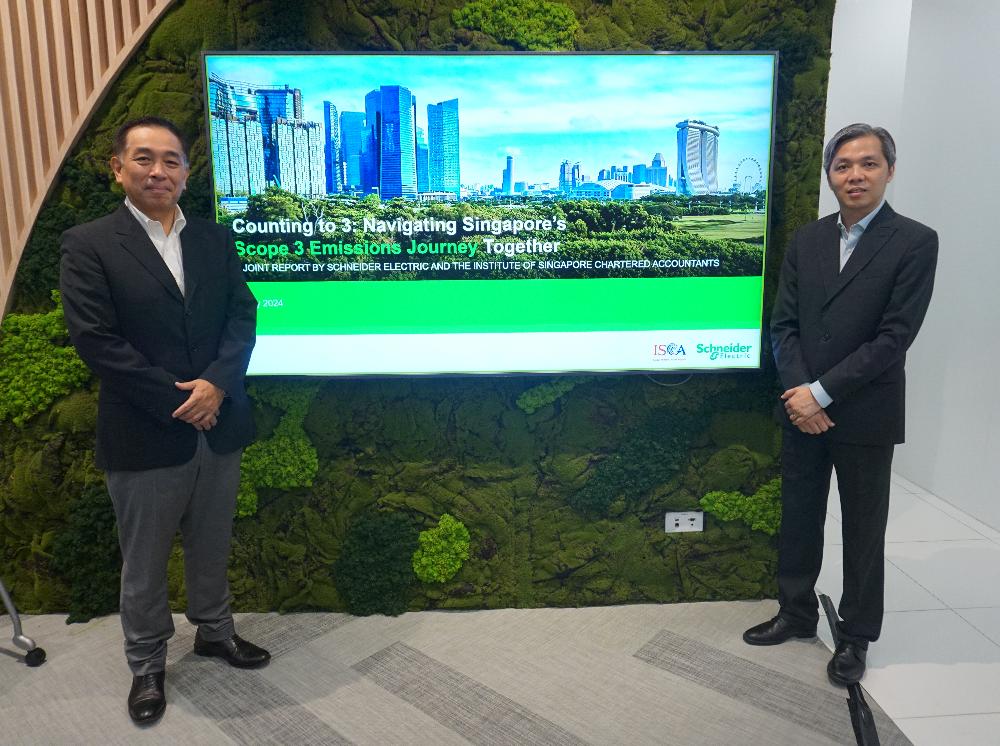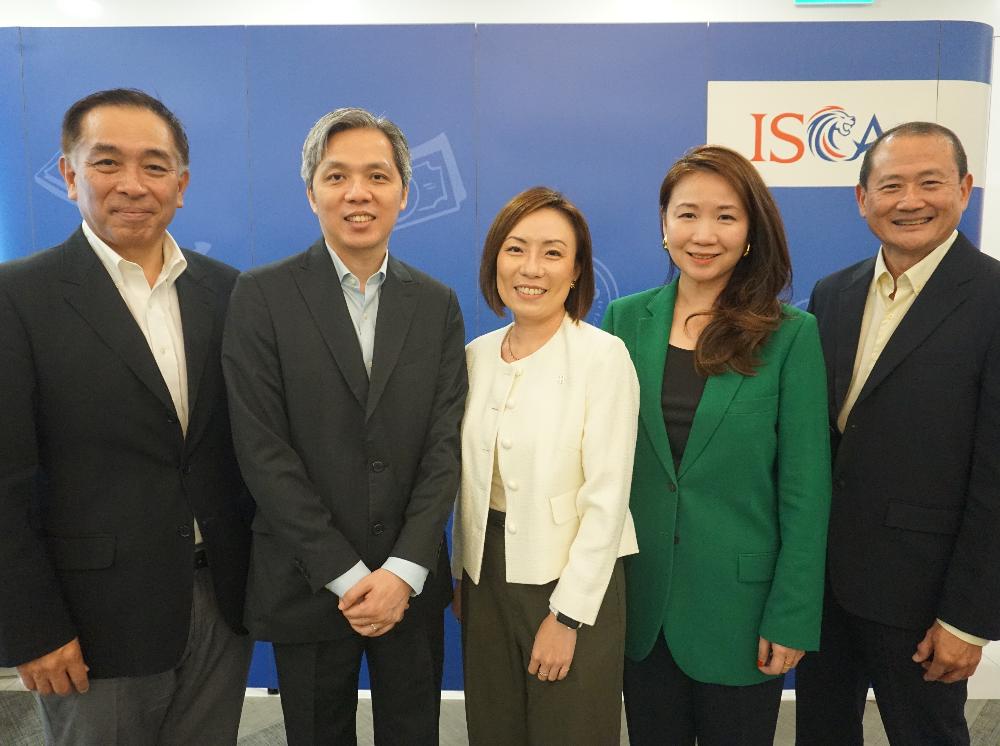Singapore, July 2 2024 – A joint study by Schneider Electric, the global leader in the digital transformation of energy management and automation, and the Institute of Singapore Chartered Accountants (ISCA), the national accountancy body of Singapore, reveals that 94% of Singapore organisations are not fully measuring and analysing Scope 3 emissions, which is impacting the readiness to report.
Launched today, the report titled “Counting to 3: Navigating Singapore’s Emissions Journey Together”, analyses the perspectives of over 500 of Singapore’s senior business leaders involved in sustainability strategies for their organisation. These leaders represent companies ranging in size from small and medium-sized enterprises (SMEs) to large multinational corporations and come from a broad range of industries.
The report comes ahead of new requirements for all listed companies and large non-listed companies in Singapore to make climate-related disclosures from 2025 and 2027, respectively.
Starting point is a distinct lack of knowledge
Only 39% of respondents claim to have a strong understanding of Scope 3 emissions, which is overall much lower than for Scope 1 (52%) and 2 (34%). This gap is significant among less senior team members: 58% of board members and 51% of C-level executives claim strong knowledge of Scope 3, while only 27% of senior managers report the same.
Differences are also seen based on roles and responsibilities, with 47% and 42% of those in General Management and Sustainability roles saying they have a strong knowledge of Scope 3, while only 33% of those in Operations & Supply chain say the same.
Respondents cite the correlation between greater seniority and greater knowledge exists due to senior executives having increased access to briefings on emissions management and strategies. However, the importance of knowledge being equally distributed across all functions and divisions within organisations was also emphasised, as change management programmes require both strategic understanding coupled with capability to implement the step changes needed for Scope 3 reporting requirements in Singapore.
Knowledge deficits linked to inaction
While over three quarters (76%) of business leaders say they have completed feasibility studies to better understand their organisation’s readiness to measure, report, and manage its Scope 3 emissions, only 6% say their organisation is fully measuring and analysing Scope 3 emissions, lagging significantly behind Scope 1 (52%) and Scope 2 (30%) emissions.
As a result, confidence in meeting their Scope 3 emissions targets is significantly lower, with only 27% believing these are highly achievable, compared to 40% for Scope 1 and 31% for Scope 2 emissions.
Leaders from larger businesses are significantly more likely to indicate they have set targets for Scope 3 (54%) compared with those at small businesses at 31%.
In further findings, only 32% believe their organisation’s net zero targets are achievable, but in a show of optimism 64% of those whose organisations have not yet set emissions targets believe they should have done so. Business leaders who adopted science-based targets (SBTis) were more likely to drive meaningful action within their organisations, helping define a clear and credible path to sustainability success.
Four groups of organisations identified based on Scope 3 progress
The report identifies four groupings of organisations in Singapore in relation to progress around managing Scope 3 emissions and the degree of management required: High Adopters (10%), Moderate Adopters (30%), Low Adopters (38%), and Emerging Adopters (22%).
From this analysis, the industries in Singapore identified as containing the highest proportion of High and Moderate Adopters combined are Consumer Goods, Energy & Mining, Healthcare & Pharmaceuticals, Financial Services, and Engineering & Construction.
Expertise, resources, motivation and technology are key barrier to progress
Overall, a lack of human and financial resources, commercial motivation, and access to fit-for-purpose technological infrastructure are highlighted by respondents as the top barriers to progressing Scope 3 emissions reduction agendas and initiatives.
However, there are differences in impact, based on segment status. For instance, while High Adopters and Moderate Adopters identify a lack of human resources or expertise as the biggest barriers to reducing Scope 3 emissions, Low Adopters and Emerging Adopters cite a lack of technological infrastructure as the biggest.
Yoon Young Kim, Cluster President, Schneider Electric Singapore and Brunei said, “Scope 3 presents the next frontier of emissions management and still unchartered territory for many organisations in Singapore. Education is critical for advancing Singapore’s green agenda. We see correlations throughout the findings of this study that a lack of understanding of key areas of management of greenhouse gas (GHG) emissions leads to a lower level of planning, target setting, and ultimately action.
“At Schneider Electric, we are deeply committed to meaningful and thorough emissions management, and we are constantly growing our capacity to help partners strategise, digitise, and decarbonise. But as with all initiatives to tackle climate change, everyone needs to be in lockstep on this journey: government and private sector businesses of all sizes and across all industries. Schneider Electric, together with ISCA, hopes this report shines a light on the most pressing areas that must be addressed if we are to make the changes that will facilitate Singapore’s path to net zero.”
Accountants are poised to play key role in sustainability reporting
Accountancy and finance professionals are well-placed to take on the role of sustainability reporting. As corporate reporters, they already have fundamental skills in financial reporting. They are also familiar with applying accounting standards and ensuring that reporting is transparent, verifiable, comprehensive, independent, and fair. In addition, accountancy and finance professionals are proficient in data collation and analysis to provide meaningful explanations for informed decision-making. These skillsets are transferable to sustainability reporting, including Greenhouse Gas scope 3 reporting.
Kang Wai Geat, Divisional Director, Professional Standards, ISCA said, “Sustainability is a megatrend that is reshaping the accountancy profession. Increasingly, organisations are turning to the accountancy profession for sustainability reporting and assurance. To take full advantage of the opportunity to help organisations advance their emissions agenda, accountants must upskill and reskill to keep up with the latest developments in sustainability.
“The accountancy profession is key to reporting sustainability performance to shed light on how companies earn their profits. Having consistent and comparable sustainability reporting will help stakeholders make informed decisions in support of sustainability. ISCA is delighted to collaborate with Schneider Electric to delve deeper into GHG scope 3 emissions management and reporting.”
Greenhouse gases (GHG) are categorised into three groups by the Greenhouse gas Protocol: Scope 1 emissions are those that stem directly from an organisation’s activities; Scope 2 emissions cover indirect emissions and largely consist of the carbon emitted from buying and using power; Scope 3 emissions are those that come from upstream and downstream activities. For example, in the construction industry, these may consist of the emissions connected to the manufacture and transportation of cement, or steel, as well as how those products are disposed of when a building is torn down.
About Schneider Electric
Our mission is to be the trusted partner in Sustainability and Efficiency.
We are a global industrial technology leader bringing world-leading expertise in electrification, automation and digitization to smart industries, resilient infrastructure, future-proof data centers, intelligent buildings, and intuitive homes. Anchored by our deep domain expertise, we provide integrated end-to-end lifecycle AI enabled Industrial IoT solutions with connected products, automation, software and services, delivering digital twins to enable profitable growth for our customers.
We are a people company with an ecosystem of 150,000 colleagues and more than a million partners operating in over 100 countries to ensure proximity to our customers and stakeholders. We embrace diversity and inclusion in everything we do, guided by our meaningful purpose of a sustainable future for all.
About the Institute of Singapore Chartered Accountants (ISCA)
The Institute of Singapore Chartered Accountants (ISCA) is the national accountancy body of Singapore with over 36,000 ISCA members making their stride in businesses across industries in Singapore and around the world. ISCA members can be found in over 40 countries and members based out of Singapore are supported through 12 overseas chapters in 10 countries.
Established in 1963, ISCA is an advocate of the interests of the profession. Complementing its global mindset with Asian insights, ISCA leverages its regional expertise, knowledge, and networks with diverse stakeholders to contribute towards the advancement of the accountancy profession.
ISCA administers the Singapore Chartered Accountant Qualification programme and is the Designated Entity to confer the Chartered Accountant of Singapore – CA (Singapore) – designation.
ISCA is a member of Chartered Accountants Worldwide, a global family that brings together the members of leading institutes to create a community of over 1.8 million Chartered Accountants and students in more than 190 countries.
For more information, visit www.isca.org.sg.





